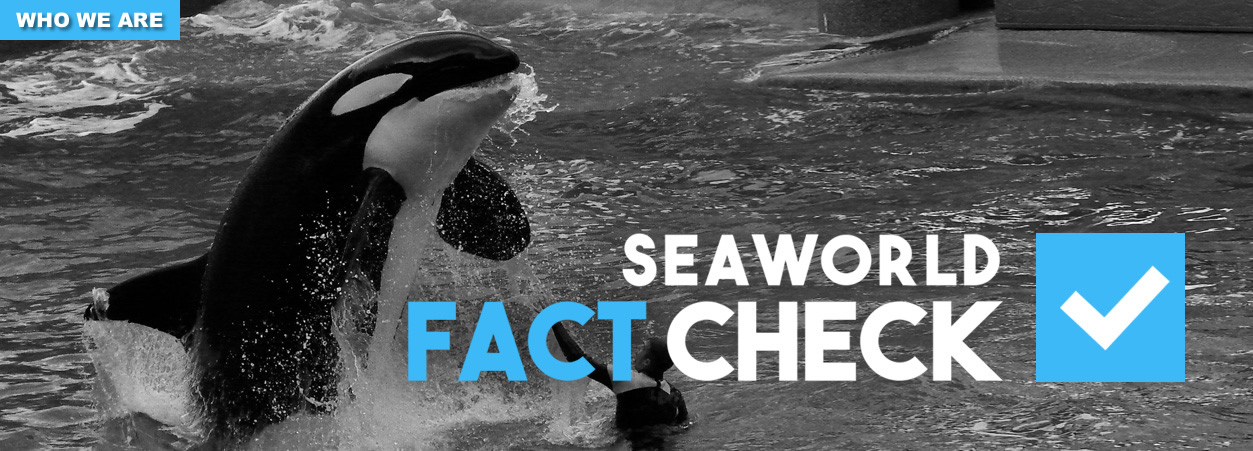SEAWORLD FACT CHECK:
SeaWorld claims that its “studies on killer whales showcase SeaWorld’s larger commitment to animal welfare1,” yet none of the company’s publications deal specifically with animal welfare (husbandry, breeding, and so on are not synonymous with “welfare”). Research on orca welfare would address the physical and mental state of the animals in the context of the “Five Domains” (Mellor and Reid 1994) and therefore would include investigations into the animals’ physical and psychological states and take into account issues such as environmental enrichment (or lack thereof), ability (or inability) to make choices, and aggressive interactions (Mellor 2015).
Notably, SeaWorld has not made its orca publications readily available for the public to download (with the exception of articles published in “open access” journals). When a zoology student asked SeaWorld for details about its research publications, the company replied, "Our research, in general, is not available for people outside the zoological society to read and review. Although we do an extensive amount of research there is little we can directly point you to [sic]2.” The company directs people to Google Scholar or a college library for its publications, when in fact very few of them are available through these sources.
SeaWorld claims that easy access to its “collection” of animals has resulted in research that helps wild counterparts3. SeaWorld’s website lists its orca-specific publications; until July 2014, the list included duplicate listings of the same papers, a book review and erroneously-cited publications4. SeaWorld claims this bibliography represented research essential to protecting free-ranging orca populations. Criticism of this bibliography (Schiffman 2014) resulted in SeaWorld removing it and posting a revised version soon after.
The revised list now shows that SeaWorld began publishing peer-reviewed papers on orcas in 1977 and since then its employees have produced only 51 publications5 (i.e., 1.3 publications per year over the 38-year period and with more than half of those published before 2000).
Of these 51, seven were not peer-reviewed (a critical aspect for classification as a scientific publication). Three deal directly with the capture of free-ranging orcas (a practice SeaWorld has pledged to discontinue6). Eight are only relevant to the keeping of captive orcas (such as artificial insemination or the demographics of captive whales). Another paper uses data collected from captive orcas, but is purely a statistical model and of no relevance to orcas (free-ranging or captive). Thus there are 32 published, peer-reviewed scientific papers related to free-ranging orcas (i.e., less than one per year). This comparatively small output of scientific publications on orcas is not consistent with SeaWorld’s claim that its research staff “contribute meaningful, scientific insights” to the research community.
In addition, the relevance to free-ranging orca conservation of several of these 32 papers is questionable. For example, two papers investigate orca platelets (platelets are found in mammalian blood), one of which compares them to human platelets. Another discusses basal metabolism of adult male orcas. SeaWorld has several adult male orcas in its “collection,” yet this study examined only one (Tilikum, who is arguably unfit due to low activity levels – see entry under TILIKUM). Therefore, the results of this study are likely anomalous, meaning they would have limited applicability to free-ranging whales.
References:
Mellor, D.J. 2015. Positive animal welfare standards and reference standards for welfare assessment. New Zealand Veterinary Journal 63: 17-23.
Mellor, D.J. and Reid, C.S.W. 1994. Concepts of animal well-being and predicting the impact of procedures on experimental animals. pp. 3-18. In: R. Baker, G. Jenkin, and D.J. Mellor (eds.) Improving the Well-being of Animals in the Research Environment. Australian and New Zealand Council for the Care of Animals in Research and Teaching, Glen Osmond: South Australia.
Schiffman, D. 2014. SeaWorld exaggerated its research record. Slate, June 17.
1 http://seaworldcares.com/research/killer-whales
2 https://www.thedodo.com/community/SamLipman/seaworld-science-strange-in-th-491661897.html
3 http://seaworldcares.com/research/research-helps-wild-whales/
4 https://web.archive.org/web/20140726065356/http://seaworld.com/en/truth/global-impact/research/publications/
5 SeaWorld is inconsistent when noting how many papers it has published, as on this section of its website – http://seaworldcares.com/research/research-helps-wild-whales/ – it states: “SeaWorld scientists have authored or co-authored hundreds of published papers. Of these, 50 contain information specific to killer whales.”
6 http://ask.seaworldcares.com/?topic=collection
_____________
SEAWORLD SAYS:
Yes. Support for research was established as a priority for SeaWorld by our founders five decades ago. SeaWorld’s animal health professionals contribute meaningful, scientific insights gained in many cases through the care of animals in our parks. We also partner with universities and research organizations, providing access to our animals and habitats for scientists conducting studies on a variety of subjects. We also provide direct support, both material and financial, to field researchers. This support is offered directly by SeaWorld, through grants from the SeaWorld & Busch Gardens Conservation Fund, and by research foundations associated with and supported by SeaWorld, including the Hubbs-SeaWorld Research Institute. Research is a key component of SeaWorld’s larger commitment to conservation and wildlife preservation.
|

